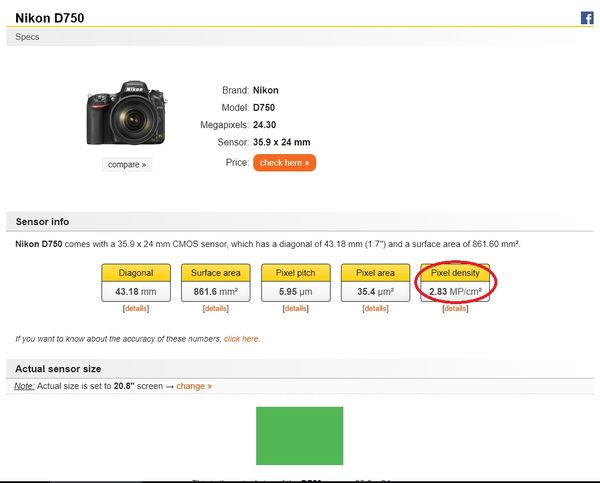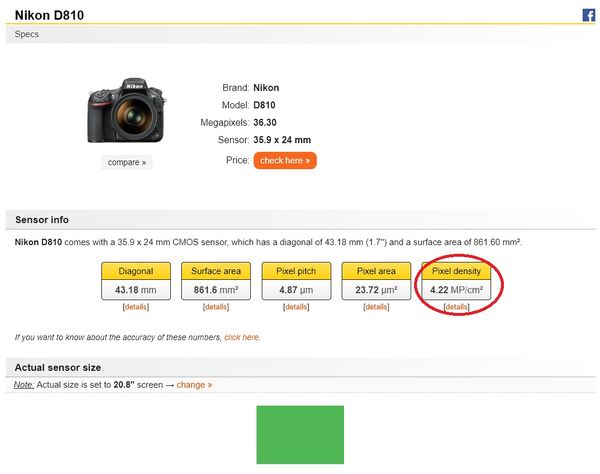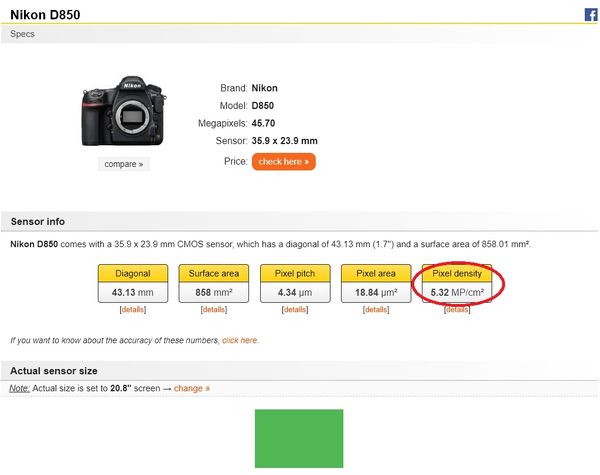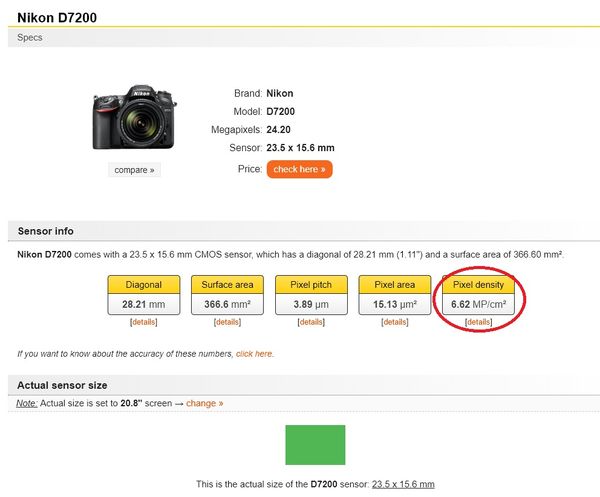Crop sensor camera verses full frame
May 17, 2018 00:53:18 #
ToBoldlyGo
Loc: London U.K.
A crop sensor 24mp camera will allow better cropping ability than a 24mp full frame sensor. Consider a bird in a tree. Using a zoom or telephoto, in the image from both cameras using the same lens, you will have more megapixels on the bird with the crop sensor, meaning you can crop more and retain much more detail. I think there may be some confusion in the posts prior to this one. Of course in landscape photography, your full frame camera image will be wider, and the larger and deeper pixels will give more dynamic range and less noise.
May 17, 2018 08:49:20 #
RichardSM wrote:
If you look long and hard I’ll venture to say you’ll find what you need to know!
I use this feature all the time and it works just fine.
Me thinks some folks don’t use the old noodle when using the SEARCH feature!
I use this feature all the time and it works just fine.
Me thinks some folks don’t use the old noodle when using the SEARCH feature!
Or they do not use their noodle when choosing a title for their post. On the other hand, you can get around the limits of the UHH search function by using google and limiting the search to UHH; Below is a search that will find the use of "crop sensor" anywhere in UHH:
"crop sensor" site:www.uglyhedgehog.com
It yields 1,310 hits.
May 17, 2018 09:05:09 #
jackpinoh
Loc: Kettering, OH 45419
AndyH wrote:
Well that's great. I happen to agree, although I lack your scientific expertise, but I take anything from a corporate executive as inherently self interested. Remember when the tobacco "scientists" were telling us all about the benefits of smoking?
But if you attack people's credibility without the facts, your own credibility (and integrity) is highly questionable.
May 17, 2018 09:42:17 #
jackpinoh wrote:
But if you attack people's credibility without the facts, your own credibility (and integrity) is highly questionable.
But I am not making any assertions at all, and if you make any conclusions about my integrity based on that one line, well, both your logic and your conclusion in this case might just be a tiny bit questionable.
I am not attacking anyone's credibility, just showing a healthy (IMHO) skepticism toward corporate spokespeople. Isn't this the same company that predicted that Nikon and Canon would see their market share drop in half from now till 2020 as mirrorless took over the market? I don't disagree with the conclusion, just with the perspective.
PS: I apologize if I sound cranky. I am, but not about your offhand comment.
May 17, 2018 11:12:27 #
therwol wrote:
Two different issues. You're talking about better... (show quote)
It is not the number of pixels that matters most, but the surface area (size) of each INDIVIDUAL pixel that will matter most for ultimate image quality and resolution, low light performance and less visible noise, whether you crop in the shot or not. The INDIVIDUAL pixel surface area of each pixel matters more than its depth or density, that is what the Sony Camera Exec. just stated in latest interview.
http://sonyaddict.com/2018/05/15/ir-sony-cp-interview-high-iso-ai-af-sony-fe-400mm-f-2-8-gm-oss-and-more/
Sony Exec just stated that the individual pixel surface area matters more than the pixel depth for quality.
All pixels ARE NOT created equal. Size matters here, the size of each individual pixel. That is why fullframe sensors rule, as their INDIVIDUAL pixels are larger, not more dense, but have larger surface area. This gives them the advantage.
Don't get confused, some fullframe cameras will automatically reduce the megapixels of the image capture when they sense a crop size lens mounted. Example my 42 megapixel Sony A7RIII will reduce the shot to an 18mp shot if it senses an APS-C lens mounted. However I can go into the A7RIII's camera menu settings and disable this, and then use any APS-C lens on the A7RIII camera and I will still get a full 42 megapixel image but with possible vignetting on the corners, as the APS-C lens is not optically designed to cover the full width of a fullframe sensor.
However,an APS-C size lens like my Sony 10-18mm lens does work, without vignetting ,on my fullframe Sony A7RIII as long as I keep it to 12-16mm, and I still get a full 42 megapixel shot using the entire fullframe sensor. I have to teach this stuff to my university photo students so I do try to be accurate here. Cheers
May 17, 2018 13:01:09 #
therwol
Loc: USA
gwilliams6 wrote:
It is not the number of pixels that matters most,
I don't disagree with you at all on your statements about pixel surface area, noise etc. I just think that at some point, the number does matter. If it didn't, we'd all take our telephoto pictures with a 50mm lens and just crop as much as we want, saving a ton of money on telephoto lenses.
May 17, 2018 13:39:07 #
therwol wrote:
Full frame sensors have lower pixel density. (Except perhaps the Nikon D850 compared with the Nikon crop sensor cameras.). If you crop a full frame to get the same image, you don't have as many pixels to work with compared with using a crop sensor camera.
How sure are you of this? They rate the number of pixels by multiplying the left side times the right side of the sensor. According to the math the 24 mpx sensor is just a 36 mpx sensor cut to a smaller size. The sensors when built are cut out of a large sheet of sensors as far as I know. They grow computer chips that way too.
May 17, 2018 13:57:34 #
ToBoldlyGo
Loc: London U.K.
drklrd wrote:
How sure are you of this? They rate the number of pixels by multiplying the left side times the right side of the sensor. According to the math the 24 mpx sensor is just a 36 mpx sensor cut to a smaller size. The sensors when built are cut out of a large sheet of sensors as far as I know. They grow computer chips that way too.
It's simply a fact.
May 17, 2018 15:04:58 #
therwol
Loc: USA
drklrd wrote:
How sure are you of this? They rate the number of pixels by multiplying the left side times the right side of the sensor. According to the math the 24 mpx sensor is just a 36 mpx sensor cut to a smaller size. The sensors when built are cut out of a large sheet of sensors as far as I know. They grow computer chips that way too.
100% sure. The sensors on different camera models are not cut from the same piece of glass. Look at these actual pixel densities, Nikon D750, D810 and D850 FX cameras followed by the D7200 DX camera (crop sensor). Download if needed to read the numbers better. All of the FX cameras have lower pixel density than the D7200. If you only use the portion of a D750 that would correspond to the size of the DX sensor, then you're only using 10.7 megapixels versus 24 megapixels in the D7200 sensor. (D810 16 megapixels, D850 19.4 megapixels)
Here is a link. Gotta give them credit, and you can look at the specs on almost any camera's sensor.
https://www.digicamdb.com/specs/nikon_d850/
May 17, 2018 19:27:07 #
Interesting links. I’ll review them when I get to a bigger screen.
May 17, 2018 19:45:33 #
therwol
Loc: USA
AndyH wrote:
Interesting links. I’ll review them when I get to a bigger screen.
You can also click on the link to the web site and put in any camera you want.
May 18, 2018 11:35:48 #
therwol wrote:
100% sure. The sensors on different camera models... (show quote)
thank you quite useful information
May 18, 2018 11:37:51 #
therwol wrote:
100% sure. The sensors on different camera models... (show quote)
again thanks much more info there than found at the manufacturer site
May 18, 2018 11:43:13 #
therwol
Loc: USA
drklrd wrote:
again thanks much more info there than found at the manufacturer site
You're welcome.
May 18, 2018 11:50:30 #
therwol wrote:
You can also click on the link to the web site and put in any camera you want.
I spent some time going over these. Very helpful, IMHO, and sort of justifies my initial decision that FOR MY PARTICULAR NEEDS, the added cost of full frame, especially the added cost of glass, isn't worth it.
I've bookmarked the link! Hope that they keep it up to date as the LAG Gear is added. Thank you!
Andy
If you want to reply, then register here. Registration is free and your account is created instantly, so you can post right away.






